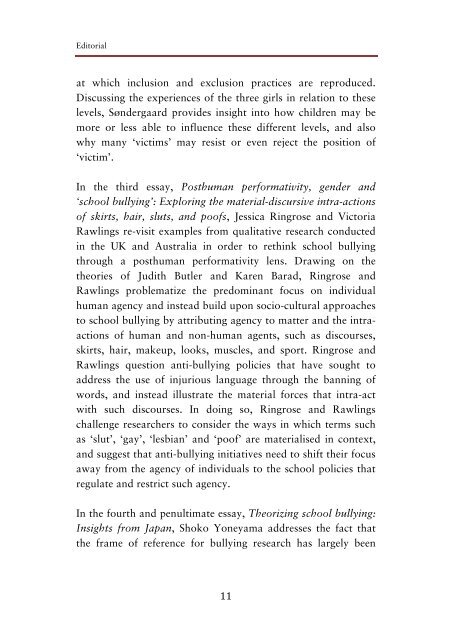You also want an ePaper? Increase the reach of your titles
YUMPU automatically turns print PDFs into web optimized ePapers that Google loves.
Editorial<br />
at which inclusion and exclusion practices are reproduced.<br />
Discussing the experiences of the three girls in relation to these<br />
levels, Søndergaard provides insight into how children may be<br />
more or less able to influence these different levels, and also<br />
why many ‘victims’ may resist or even reject the position of<br />
‘victim’.<br />
In the third essay, Posthuman performativity, gender and<br />
‘school bullying’: Exploring the material-discursive intra-actions<br />
of skirts, hair, sluts, and poofs, Jessica Ringrose and Victoria<br />
Rawlings re-visit examples from qualitative research conducted<br />
in the UK and Australia in order to rethink school bullying<br />
through a posthuman performativity lens. Drawing on the<br />
theories of Judith Butler and Karen Barad, Ringrose and<br />
Rawlings problematize the predominant focus on individual<br />
human agency and instead build upon socio-cultural approaches<br />
to school bullying by attributing agency to matter and the intraactions<br />
of human and non-human agents, such as discourses,<br />
skirts, hair, makeup, looks, muscles, and sport. Ringrose and<br />
Rawlings question anti-bullying policies that have sought to<br />
address the use of injurious language through the banning of<br />
words, and instead illustrate the material forces that intra-act<br />
with such discourses. In doing so, Ringrose and Rawlings<br />
challenge researchers to consider the ways in which terms such<br />
as ‘slut’, ‘gay’, ‘lesbian’ and ‘poof’ are materialised in context,<br />
and suggest that anti-bullying initiatives need to shift their focus<br />
away from the agency of individuals to the school policies that<br />
regulate and restrict such agency.<br />
In the fourth and penultimate essay, Theorizing school bullying:<br />
Insights from Japan, Shoko Yoneyama addresses the fact that<br />
the frame of reference for bullying research has largely been<br />
11


